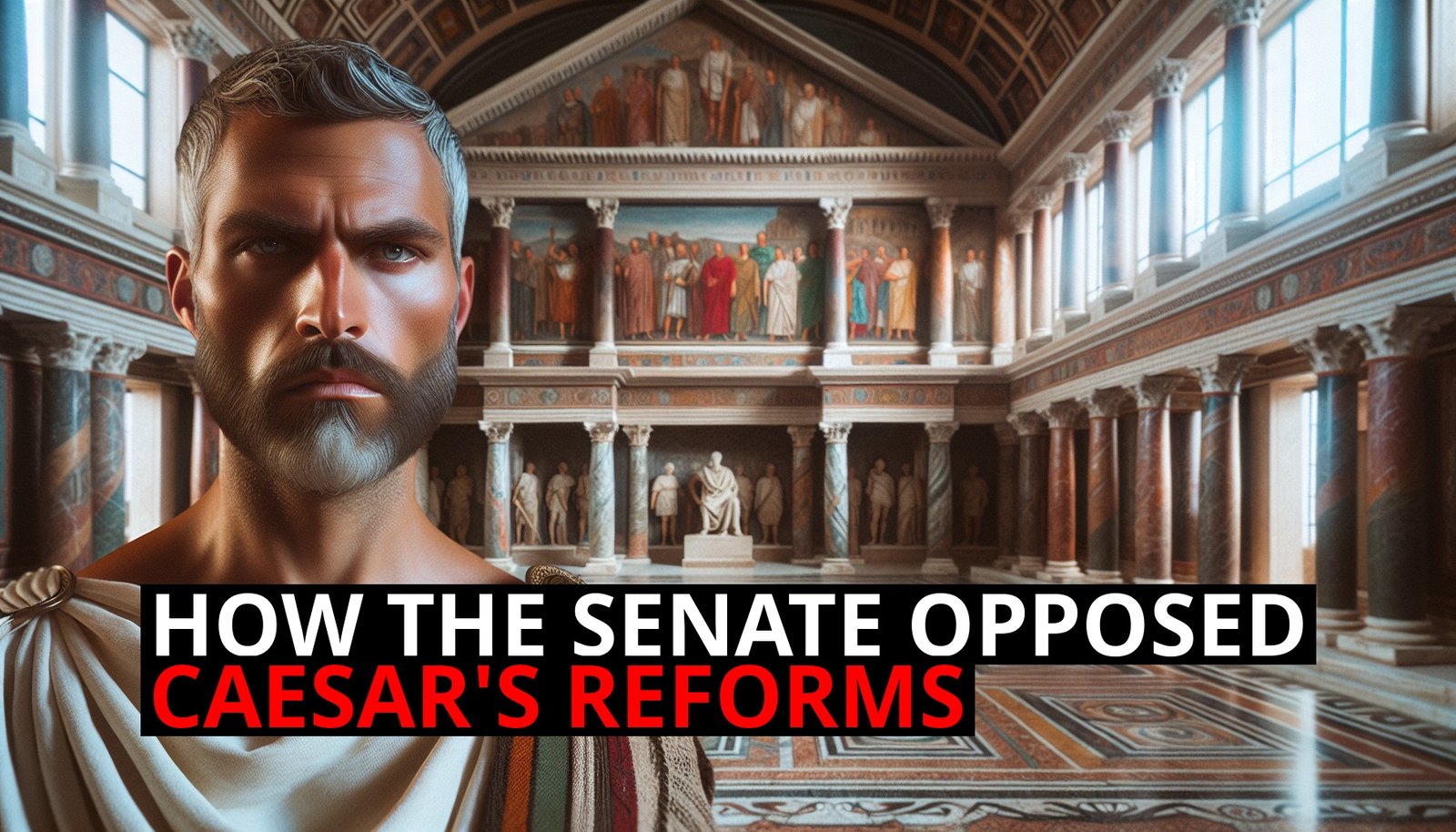Imagine a leader rising to power with promises of sweeping reforms—offering debt relief, distributing land to veterans, and improving the lives of the common people. You’d think these changes would be welcomed by the government, right? Well, not in ancient Rome. When Julius Caesar proposed popular reforms aimed at addressing Rome’s deepening inequality, the Roman Senate—a powerful group of elite aristocrats—did everything in their power to stop him. But why? Wasn’t Caesar trying to do what was best for the people?
The truth is, the Roman Senate wasn’t interested in helping the masses. They were far more concerned with preserving their own wealth and influence. This is the story of how an oligarchic Senate fought tooth and nail to protect their power, even if it meant opposing the very reforms that could have saved the Republic.
To understand why the Senate was so determined to oppose Caesar’s reforms, we need to look at how the Roman Republic actually worked. On paper, Rome was a democracy, where citizens had the right to vote and participate in politics. But in reality, the true power lay with the Senate, a closed circle of wealthy aristocrats who made decisions behind the scenes. They weren’t just running the government—they were maintaining an aristocratic monopoly on wealth, resources, and political offices. And any threat to that control was met with fierce resistance.
The Senate’s grip on power wasn’t simply about governance; it was about maintaining their status and privilege. While the Roman Republic may have presented itself as a beacon of democracy, the Senate functioned more like an oligarchy. They controlled everything from land distribution to financial policies, and any attempt to shift that balance of power was seen as a direct threat to their dominance.
Julius Caesar was different. Unlike the Senate, he understood the struggles of the common people. His reforms were aimed at addressing the growing gap between Rome’s rich and poor—a problem the Senate had ignored for years. Caesar proposed redistributing public lands to veterans, offering debt relief, and expanding the Senate to give more representation to the provinces, where many Romans lived and worked. These reforms weren’t just popular among the masses—they were crucial for stabilizing Rome, which was on the brink of social collapse.
But to the Senate, these reforms represented a direct challenge to their control. Land reform threatened the massive estates held by the aristocracy. Debt relief undermined the Senate’s financial dominance. And expanding the Senate meant weakening the exclusive circle of power they had built for centuries. To them, Caesar wasn’t just a reformer—he was a disruptor who threatened the very foundations of their authority.
So, how did the Senate respond? By protecting their power at all costs. They launched a campaign to undermine Caesar’s credibility, branding him as a tyrant who sought to destroy the Republic and crown himself king. But many of these claims were either exaggerated or outright false. The Senate’s real fear wasn’t Caesar’s ambition—it was his ability to shift power away from the elite and toward the people.
Their strategy was simple: paint Caesar as a dictator and stir up fears of monarchy. They weaponized the language of democracy to justify their resistance, even though their true motives were far more self-serving. They weren’t defending the Republic—they were defending their aristocratic privileges. In one of their most infamous acts, the Senate forced Caesar into a position where he had no choice but to cross the Rubicon with his army, sparking a civil war. Their opposition wasn’t about saving democracy—it was about stopping a leader who threatened their monopoly on power.
Yet, despite their best efforts, the Senate’s opposition to Caesar ultimately failed. By refusing to engage with popular reforms, the Senate alienated themselves from the very people they claimed to represent. While Caesar was seen as a hero by the masses, the Senate increasingly appeared as an out-of-touch oligarchy, more concerned with protecting their wealth than addressing Rome’s real problems. Even after Caesar’s assassination in 44 BCE, the Senate’s influence continued to crumble. They had succeeded in stopping one man, but they couldn’t stop the tidal wave of social and political change that followed. Their failure to embrace reforms deepened Rome’s divisions and paved the way for the rise of the Roman Empire—where emperors would hold far more power than Caesar ever did.
The story of the Senate’s opposition to Caesar is a cautionary tale about the dangers of elite resistance to necessary change. In their desperate attempt to protect their aristocratic dominance, the Senate accelerated the very downfall they were trying to prevent. By refusing to address the needs of the people and resisting reforms, they sowed the seeds for the end of the Roman Republic.
Julius Caesar may have been a controversial figure, but his reforms were a genuine attempt to address the real issues facing Rome. The Senate’s opposition wasn’t about defending democracy—it was about defending their own privilege. And by failing to recognize the need for change, they left a power vacuum that future emperors would gladly fill.
In the end, the Senate’s opposition to Caesar serves as a powerful example of what happens when elites resist change to protect their own interests. They risk not only their own power but the stability of the entire system. For Rome, the price of that resistance was the fall of the Republic and the rise of imperial rule.
If you found this look into Rome’s political struggles insightful, don’t forget to subscribe for more fascinating stories from history. And remember, the lessons of the past are often more relevant than we realize.













